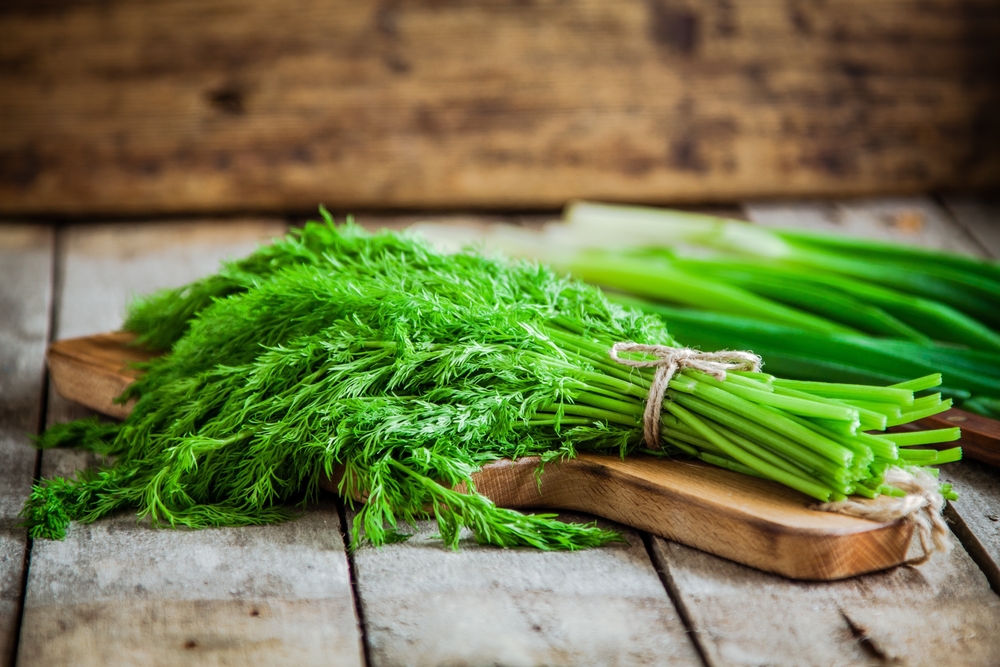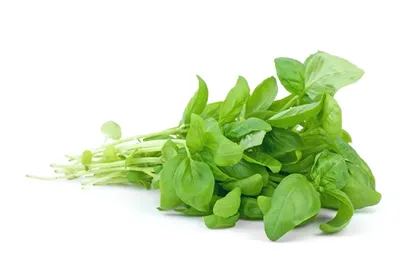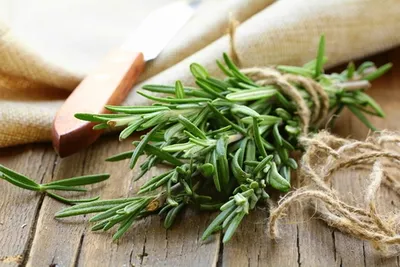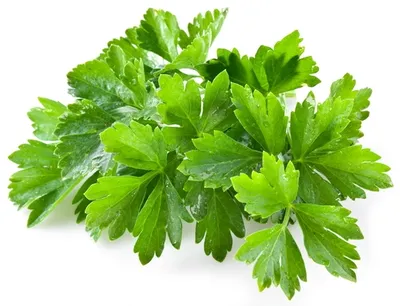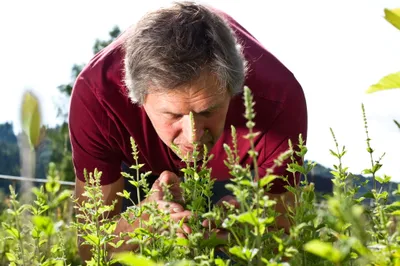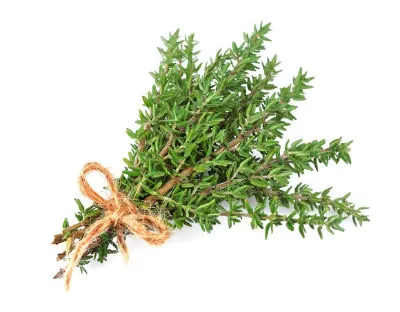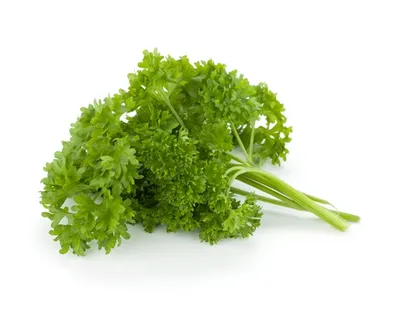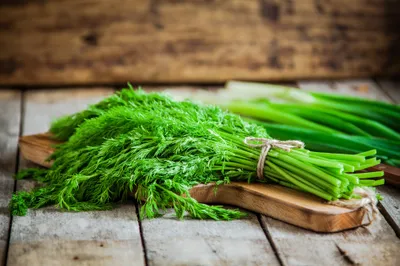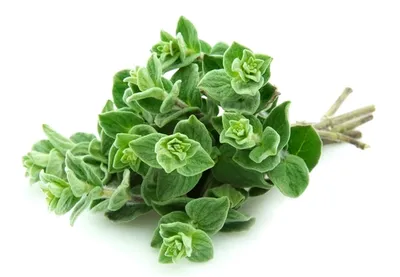Herb gardens provide you with fresh, flavorful additions to recipes and can be easy to maintain indoors or outdoors, offering flexibility depending on the climate you live in and the space available to you. Herbs can make a significant improvement on the flavor of dishes, but they’re more than just tasty. Many herbs, especially fresh ones, offer health benefits and natural healing properties, even in small amounts.
Even if you don’t have an outdoor garden or much room inside, you can grow several varieties of herbs in very small spaces. So whether you’ve already had an herb garden or are starting from scratch, learn what herbs to grow and why—some are easier to grow and provide they provide great health benefits…
1. Basil
Fresh basil packs a very powerful flavor and it’s used in many dishes and drinks because of its ability to complement and enhance other flavors. On top of the way it tastes, basil can be really good for the body because it contains many nutrients, including vitamin K, iron, calcium, potassium, and magnesium. Research has shown that basil may help prevent heart disease, reduce the impact or slow the development of arthritis, and improve blood flow.
Basil is one of the easier herbs to grow, especially indoors where you can control the temperature and ensure it gets lots of warmth and light. It grows fairly quickly and if you snip off the leaves when they’ve matured you’ll see new stems begin to grow soon after. Basil plants are quick to replenish, so you shouldn’t have to re-seed or buy new plants after harvesting. You should use a pot with good drainage and if you plant it outdoors, it should also be in an area that drains well. Water every other day for the best results.
2. Rosemary
Rosemary is a very aromatic herb and one that you’ll enjoy the scent of if you decide to grow it indoors. But rosemary is more than just something that releases a pleasant and relaxing scent. It contains compounds that are believed to help your body fight cancer cells, potentially preventing them from developing. It’s also known for assisting in pain relief and the antioxidants it contains can reduce inflammation.
When planting rosemary in your herb garden or pot, make sure you put it somewhere that will get a lot of sunlight. It needs to be thoroughly watered, but the soil should dry out in between watering. Rosemary won’t grow in soil that’s wet all the time so do your best to allow it lots of sun and warmth. Depending on your growing options, if you plant rosemary indoors you should use a pot that allows the water to drain out of the bottom into a dish. Just make sure it gets as much sun as possible if you grow it inside.
3. Cilantro
Vitamin K is an essential nutrient that contributes to bone health, something cilantro is incredibly rich in. There’s been quite a bit of research on the potential health benefits of cilantro, most notably how it might help with cardiovascular health, improve sleep, and lower blood sugar. Cilantro has recently been making its way into blended health drinks or shakes to add even more nutritional value to go with the various fruits, veggies, yogurts, and oils in these drinks.
Cilantro can be a bit finicky to grow and some people struggle to grow it indoors, so you might have to take extra care to get established and staying healthy. You might want to start it indoors, but transfer it to your garden once it’s a few inches high. Cilantro needs space to grow, so keep it at least 12 inches apart and in a well-drained area. Cilantro also needs a lot of sun, but it doesn’t do well in very hot environments, so plant it in partial shade if your summers are hot. Keep the soil moist as it grows, watering a few times a week.
4. Mint
An easy herb to grow, and one that’s packed with some powerful health benefits, is mint. This herb is frequently used as a natural remedy to soothe stomach aches and nausea. There are a lot of species of mint, offering different nutritional value depending on the variety. Some species are very good sources of antioxidants and vitamin A, and may reduce headaches and help heal or reduce symptoms of respiratory illnesses. Studies have also shown that it may help reduce symptoms of irritable bowel syndrome (IBS).
Mint doesn’t require much sunlight so it’s great for gardens that don’t get a lot of sun (or in spots where you don’t have a good place to set a pot near a window inside your home). Although it’s easy to grow, mint needs frequent watering and space to thrive. Mint can be used to complement a lot of different flavors and it’s often surprising the kind of things you can mix it with. Whether you make a fresh summer salad, muddle it in drinks, or chop it up in a favorite dish, you’ll find many uses and reap the benefits of growing your own mint.
5. Thyme
Thyme contains a very high amount of antioxidants, giving your body strength to fight off and even possibly prevent certain illnesses and diseases from developing. It’s been shown to help with many types of respiratory illnesses, soothe stomach aches, and ease digestion problems. Thyme is a great source of vitamin C, but it also has a good amount of vitamin A, iron, and manganese.
Growing thyme is usually an easy process and provides you with a fresh herb to add to dishes, but it’s also a plant that is aesthetically appealing; it’s often used as ground cover and has a nice flower that blooms in summer. Plant thyme in full sun for the best results. Tip: If your herbs grow faster than you can use them, you can freeze them instead of letting them die or potentially killing the plant because they need to be cut to thrive. Most herbs are just fine to cook with and still contain nutrients after being frozen, so pack them away and keep your herb garden healthy.
6. Parsley
Parsley is another herb that can benefit not only the food you eat by adding fresh flavor but it may also offer health benefits to your body. Parsley is often used as a garnish, but it’s proven its place in foods and contains enough vitamin A and C in a small amount to meet the daily recommended servings of these vitamins. It’s also rich in antioxidants, can give the immune system a natural boost, and can help with digestion. Research on animals has shown that parsley may even help prevent breast cancer from developing by decreasing the amount of cancerous tumors and even delaying the growth of tumors.
More research needs to be done, but the apigenin found in parsley, which is a compound that reduces inflammation, is what’s thought to fight and prevent breast cancer. Parsley needs sunlight and warmth, and grows best in moist soil. With so many potential health benefits, parsley is a good choice to add to your herb garden. People say it requires patience though because it takes about 2- to 3-months to grow enough to eat it.
7. Dill
Dill contains many nutrients in small amounts, so you don’t get a lot of nutrients because you don’t need much dill to flavor dishes and add to seasonings. However, there are a few nutrients in higher amounts in dill, including calcium, vitamin A and C, as well as antioxidants. Research is still currently being done on the health benefits of dill, but completed studies on animals and reviews of its use in certain cultures have shown that it might help with digestion, reduce inflammation, relieve menstrual pain and disorders, destroy harmful cells, contribute to healthy skin, and boost the immune system.
When planting and harvesting dill, you’ll notice that it grows quickly and looks like a weed. Although it isn’t the most visually appealing herb, the quick growth and easy maintenance make it a good choice for an herb garden. You just have to make sure to cut it back and not allow it to take over a huge section of your garden or other plants in pots. Dill needs sunlight and well-drained soil, but it will still grow in partial shade.
8. Oregano
Oregano is used in one of America’s favorite foods, pizza, and it’s a staple ingredient in tomato sauces. It’s also used in meat marinades, breads, and mixed with other herbs and ingredients for various types of seasoning. It’s popular for its flavor, but what many don’t know is how healthy this herb actually is. Oregano is full of vitamins, minerals and other nutrients that are good for your body. Oregano is high in antioxidants and contains natural anti-inflammatory properties. It could boost the immune system and help with respiratory illnesses, and it might even fight off cancer cells.
Luckily, oregano is an herb that is fairly easy to grow and care for. Since oregano plants grow better in soil that is drained and doesn’t keep the roots wet or soggy, you should plant it with herbs that have similar requirements, such as rosemary. Herbs should always be grouped together based on the amount of water and sun it needs, as well as how the soil needs to be kept (drained, dry between watering, moist, and so on). Oregano will thrive in full sun, with flowers that offer an aesthetic appeal when planted in an outdoor garden.
